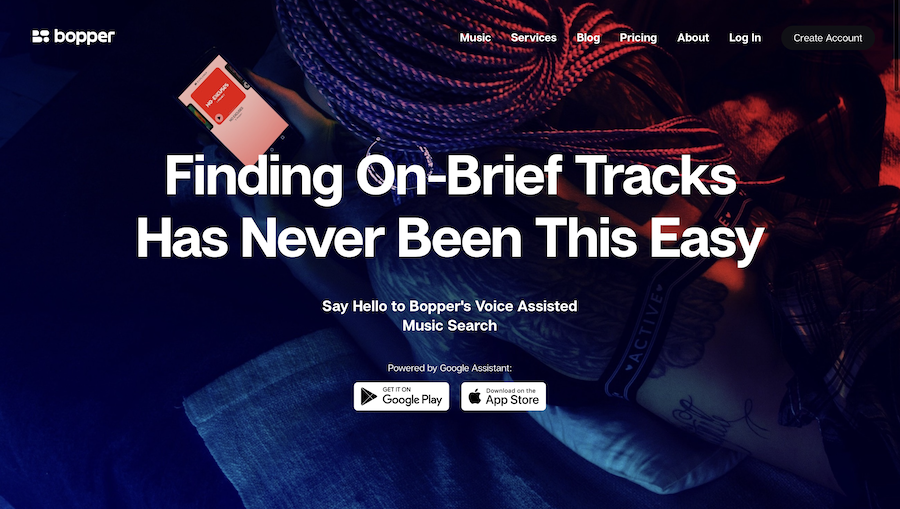Music platform Bopper recently announced their latest experiment: a voice-assisted licensing engine. In the following article, co-founder and VP of Products and Partnerships Phil Messier explains why and how they built it.
In January the product team at Bopper sent a new device in the wild: a functional voice-assistant licensing engine, built for the widely adopted Google assistant platform. As far as we know this is the first voice powered initiative in music licensing, and many are asking why we built it. The short answer is we believe voice search to be transformative enough to have us wonder what it means for us.
“We believe voice search to be transformative enough to have us wonder what it means for us.”
In 2018, I got involved in a friend’s company who created a voice assistant in the travel industry and I was shocked by what I learned. Across the board the adoption numbers are off the charts but let’s just consider a few: In 2020, three quarters of US households owned at least one smart speaker, and more than half of these people used their devices daily. If that wasn’t enough to get me excited, guess what the top activity is, above checking the weather and setting an alarm? Yes, playing music. As much we’re all biased to think nothing ever really changes, and that people will always license music as they do now, as a business owner, these are signs I’ve learned not to ignore.
The challenge is obvious: how do you fit the complexity of searching for a precise sound in such limited circumstances, as well as license it in such a limited channel? Well the first finding is that the licensing part is actually a very voice-friendly task, right out of the gate. Technologically speaking, getting a license price to use a piece of music in a specific context boils down to asking a series of questions, which answers feed into our pricing algorithm. The question and answer part is itself already very conversational by nature. Even in its simplest form, it’s a good experience.
The searching part is more complex. If a user knows the song and artist it’s looking for, like they often would on a commercial streaming platform, this is easy. The challenge is that most people search music for their productions based on music genres and moods and so on. We’re used to using a variety of tools to achieve this, e.g. filters, adding keywords, etc. Most of this is not very intuitive in the voice space. Part of our solution is to use a hybrid interface, where visual feedback is used in addition to voice commands. What we end up with, and it’s a good metaphor to run with for our future development, is that it’s like looking at a nice clean display of music in a record store, and being to ask a bunch of questions to a ridiculously knowledgeable and potent clerk, always with you. This has value, and this has become the vision.
“One of the key findings on that front is that the overall effectiveness is closely linked to the quality of our curation and data.”
One of the key findings on that front is that the overall effectiveness is closely linked to the quality of our curation and data. Even with a hybrid interface, the channel is so limited in size and scope that every single result must be delightful and to the point. There is not enough room for the wrong music. Practically speaking, this means a voice assistant in our field can’t fly solo. It must be backed by above average curation and tagging technology. It’s a welcome finding since it aligns very well with efforts to tame choice anxiety and other irritants induced by unfettered digital technology.
So, will voice assistants replace the desktop screen as the primary tool for licensing music? We could point to voice assistants not as being very prevalent in the B2B space, but in my opinion, that would be a narrow view. If content producers see value, and they can integrate voice assistants in their workflow adoption will begin. So far, we’ve become very confident about the former, and the next few months of feedback from our users should give us better insights about the latter.
See the voice-assistant licensing engine in action:
